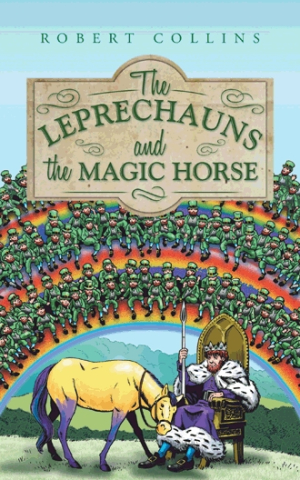The Leprechauns and the Magic Horse
This interesting comparison of human and leprechaun perspectives explores how worldliness prevents cultural ignorance.
The Leprechauns and the Magic Horse is a simply written yet thematically thought-provoking fantasy novella for readers of all ages.
In the land of the leprechauns, King Leon boasts that no kingdom can compare to his in riches, warriors, and goodness. His high adviser, David, scoffs at the king’s ignorant pride. He claims there is a province in Ireland, Armagh, to which their kingdom would pale in comparison, and where the people are giants relative to the six-inch-tall leprechauns. King Leon immediately arrests David for treason, and David warns that as a result of his ignorance, the king will suffer as a prisoner for a year in Armagh. The king then agrees to allow David the chance to prove the existence and power of Armagh. So begins a fantastic tale of adventure, tolerance, and forgiveness that changes the worldview of the leprechauns and the people of Armagh forever.
Robert Collins’s strength lies in his ability to tell parable-like stories in a syntactically simple way, and to make them universally relevant. The conflict between the dense but physically domineering humans of Armagh and the magically powerful but tiny leprechauns is a unique way to illustrate the importance of respect for diversity. The juxtaposition of sizes of the leprechauns and humans, and the subsequent differences in perspectives—both literally and figuratively—effectively demonstrates otherness.
While it would easy to assume that the struggle in a fantasy parable would involve great battles and warring kingdoms, the conflict between Armagh and the Land of Leprechaun is surprisingly subtle. The two cultures learn from each other and exchange ideas, uniquely demonstrating the moral that understanding and tolerance are more important than revenge.
What keeps the novella from being fully satisfying are the plot holes, lack of world-building, and the randomness of details. For example, at the beginning of the story, David rather nonchalantly mentions that as a result of his arrest by King Leon, several men would die. That portion of his prophecy is never referenced again, and it seems uncharacteristically cruel for the rational David to decree the death of innocent people. Additionally, David’s prophecy, among other plot points, brings up confusion about exactly what magical powers the leprechauns possess, their origins, and the limits of their powers. While there is extensive detail about the leprechauns’ magical objects, perhaps an even portrait of the leprechauns could have been more effectively described via vivid imagery and concrete explanations of the limits of the world.
Robert Collins’s The Leprechauns and the Magic Horse is an easy, imaginative, and parabolic read for all fantasy readers.
Reviewed by
Paige Van De Winkle
Disclosure: This article is not an endorsement, but a review. The publisher of this book provided free copies of the book and paid a small fee to have their book reviewed by a professional reviewer. Foreword Reviews and Clarion Reviews make no guarantee that the publisher will receive a positive review. Foreword Magazine, Inc. is disclosing this in accordance with the Federal Trade Commission’s 16 CFR, Part 255.

